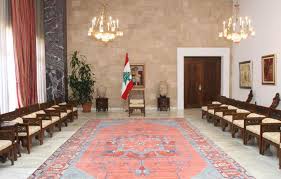Halim Shebaya

Huffington Post
In potentially the most abrupt U-turn in Lebanese politics since the signing of the Memorandum of Understanding in February 2006 between Hizbullah's Sayyed Hassan Nasrallah and the Free Patriotic Movement's former-PM General Michel Aoun, Lebanese Forces leader Dr. Samir Geagea stunned his March 14 allies by endorsing (see video below) Aoun's nomination for the Lebanese Presidency on the 20th of January 2016.
Lebanon has been without a President since May 2014. As per Lebanese custom, the President should be Maronite (Eastern Catholic) and is elected by the convening of Parliament with a minimum of a two-thirds quorum. This quorum has been unavailable since Aoun (backed by March 8 coalition) has refused to send his parliamentary bloc without the assurance that he - or someone he nominates - is elected as President.
Geagea's endorsement does not necessarily mean that Aoun enjoys majority support in Parliament. The Lebanese Forces currently hold 8 seats (this is expected to increase during the next elections) and he would need to convince some of his allies to secure Aoun's successful bid.
Former-PM Saad Hariri's endorsement would be enough, as his is the largest bloc in Parliament. However, Hariri has recently decided to nominate one of Syrian President Assad's closest friends in Lebanon, Mr. Sleiman Frangieh.
Geagea's counter-nomination was in large part spurred by his seeming preference to see Aoun (his archrival) and not Frangieh (his rival in the North of Lebanon) as President.
It was also partly driven by a frustration with the manner in which Hariri dealt with the Presidential issue and nominated Frangieh without consulting his most prominent Christian ally. This was in contrast to the way in which Hizbullah's Sayyed Hassan Nasrallah steadfastly supported Aoun's nomination and refused to discuss the Presidential portfolio, instead always pointing in the direction of Aoun as the linchpin of any resolution.
In this regard, one of the most common statements we would hear in the past years was that Christians are unable to unite and that remains the reason behind their limited influence in the country. Reference is made to the other denominations that have a clear leader, i.e. Hariri for the Sunnis and Nasrallah for the Shia.
Also, a main issue voiced by Lebanese Christians is the following: why is it the case that Sunnis get to elect the Prime Minister, and the Shia get to choose the Speaker, whereas Christians are denied the right to choose their preferred strongest candidate as President?
Following Geagea's nomination of Aoun, Geagea asked Sayyed Hassan Nasrallah to make up his mind and to convince his March 8 allies to back Aoun as President. His rationale was that his bloc would be enough along with the March 8 coalition to elect Aoun as the next President.
However, what this rationale missed is the fact that Aoun has been clear that he would not be a President except if there were a national consensus around him. In practical terms, Aoun wants and needs Hariri's endorsement as he cannot be seen as being on the side of the Shia at a time of growing tensions between Saudi Arabia and Iran, and their respective allies in Lebanon.
Lebanese people were waiting for Nasrallah's position as it was claimed that he was in a sticky position. Whom would he choose between two close allies (Aoun and Frangieh) who are both closer to the Syrian-Iranian axis?
Friday's (January 29) press conference clarified Hezbollah's position (see video below). All one needed to take note of was the first sentence in Nasrallah's speech. He quoted an Islamic saying that emphasized the importance of truthfulness and loyalty.
In other words, Nasrallah wanted to state unequivocally that he was unwavering in his support for Aoun. He further stipulated that the only way in which that support may be revoked would be if Aoun himself withdraws his nomination.
If indeed there is a fear (as March 14 parties claim) that Hizbullah wants a presidential vacuum, and if indeed it is correct that Hizbullah is using Aoun as a scarecrow to block the election of a president for regional and domestic considerations, what better way to disrupt this plan than by going down to Parliament and electing Aoun as Lebanon's new President, especially given the recent endorsement of Aoun by March 14's presidential candidate himself.
And this takes us to the central question in relation to the presidency at the moment: is Hariri able to co-exist with a strong Christian president (Aoun) who now has the backing of his strongest Christian ally (Geagea)?
This article originally appeared on openDemocracy